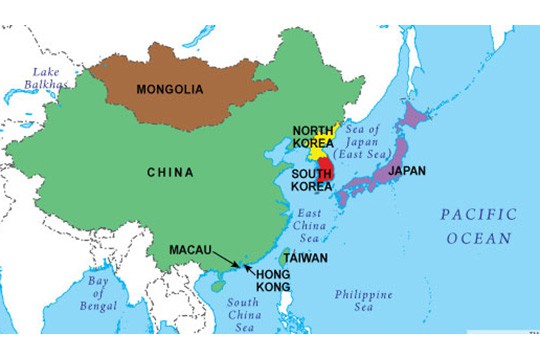The power dynamic in North-East Asia is undergoing a dramatic change against the backdrop of the “no limits” strategic partnership between China and Russia, notes M.K. Bhadrakumar, Indian Ambassador and prominent international observer.
The collapse of Kyiv’s counteroffensive” and abject defeat in the war with Russia may compel Biden administration to put “boots on the ground” in western Ukraine, triggering a global confrontation, and, equally, the US-China relations are at their lowest point since their normalisation in the 1970s, while Taiwan issue may potentially turn into a casus belli of war.
To be sure, the Northeast Asian theatre is going to be a crucial arena in the brewing big-power confrontation what with the Arctic hotting up and the Northern Sea Route becoming operational, which will catapult the strategic importance of the Russian Far East and Siberia as the powerhouse of the world economy in the 21st Century combining with its present status as the world’s number one nuclear power.
The outcome of the Ukraine war might be the last chance for the United States to rein in Russia from keeping its tryst with destiny. That is what makes the Far East the most consequential region for the US in its global strategy.
Symptomatic of the cascading tensions, Russian Foreign Ministry summoned the Japanese ambassador and a protest was lodged in extraordinarily harsh language, as it came to be known that the 100 vehicles that Tokyo innocuously promised last week to Ukraine would in reality be armoured vehicles and all-terrain vehicles. Apparently, Tokyo was dissimulating, since Japan’s export rules ban its companies from selling lethal items overseas!
Tokyo is crossing a “red line” and Moscow is not amused. The Foreign Ministry statement “stressed that the administration of Prime Minister Fumio Kishida should be ready to share responsibility for the deaths of civilians, including those in Russia’s border regions… (and) driving bilateral relations even deeper into a dangerous impasse. Such actions cannot remain without serious consequences.”
Significantly, in a video conference with General Liu Zhenli, Chief of Staff of the Joint Staff Department of China’s Central Military Commission, the Chief of the General Staff of Russian Armed Forces and First Deputy Minister of Defence General Valery Gerasimov expressed confidence in the expansion of military cooperation between the two countries and noted, “Coordination between Russia and the People’s Republic of China in the international arena has a stabilising effect on the world situation.”
The big picture is that the shift in Japanese policies through the past year — close alignment with the US regarding Ukraine; copying the West’s sanctions against Russia; supply of lethal weaponry to Ukraine, etc. — has seriously damaged the Russo-Japanese relationship. On top of it, Japan’s re-militarisation with American support and its growing ties with the NATO (which is lurching toward the Asia-Pacific) makes Tokyo a common adversary of both Moscow and Beijing.
The imperative to push back this resurgent US client is strongly felt in Moscow and Beijing, which also has a global dimension since Russia and China are convinced that Japan is acting like a surrogate of American dominance in Asia and is subserving western interests. On its part, in a turnaround, Washington now actively encourages Japan to be an assertive regional power by jettisoning its constitutional limits to rearmament.
What worries Moscow and Beijing is also the ascendance of revanchist elements — vestiges of Japan’s imperial era — in the top echelons of power in the recent period. Of course, Japan continues to be in denial mode as regards its atrocities during the period of its brutal colonisation of China and Korea and the horrific war crimes during World War 2.
This trend bears striking similarity to what is happening in Germany, where too the pro-Nazi elements are reclaiming habitation and a name. Curiously, a German-Japanese axis is present at the core of Washington’s strategies against Russia and China in Eurasia and Northeast Asia.
Arguably, in his zest to integrate Japan into the US-led “collective West”, Prime Minister Kishida overreached himself. He behaves as if he is obliged to be more loyal than the king himself. Thus, on the same day that President Xi Jinping visited Moscow in March, Kishida landed in Kiev from where he went to attend a NATO Summit and openly began lobbying for establishment of a NATO office in Tokyo.
Kishida followed up by hosting NATO Secretary-General Jens Stoltenberg in Tokyo and giving him a platform to berate China publicly from its doorstep. There is no easy explanation for such excessive behaviour. Is it a matter of impetuous behaviour alone or is it a calculated strategy to gain legitimacy for the ascendance of revanchist elements whom Kishida represents in the Japanese power structure?
To be sure, Northeast Asia is a priority now for China and Russia, given their overlapping interests in the region.
NATO expansion to Asia and the sharp rise in the US force projection bring home to the defence strategists in Beijing and Moscow that the Sea of Japan is a “communal backyard” for the two countries where their “no limits” strategic partnership ought to be optimal. The Chinese commentators no longer downplay that the Russian-Chinese military ties “serve as a powerful counterbalance to the US’ hegemonic actions.”
read more in our Telegram-channel https://t.me/The_International_Affairs

 10:23 13.06.2023 •
10:23 13.06.2023 •























